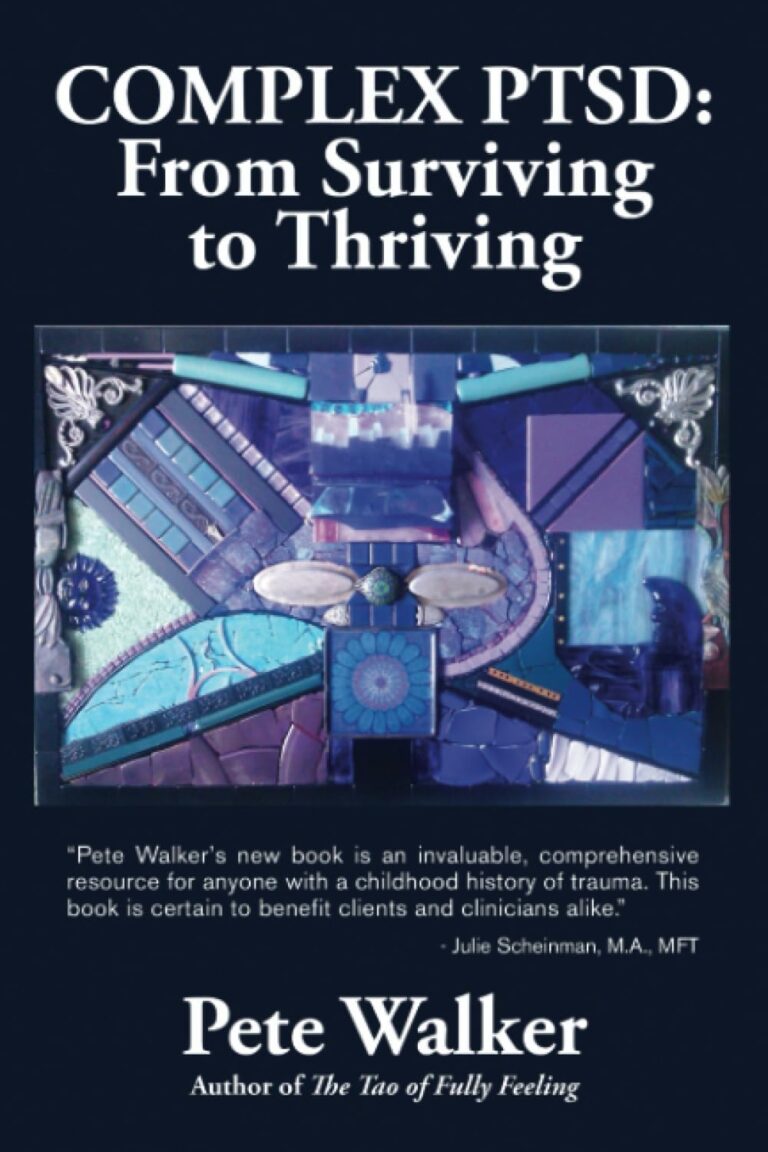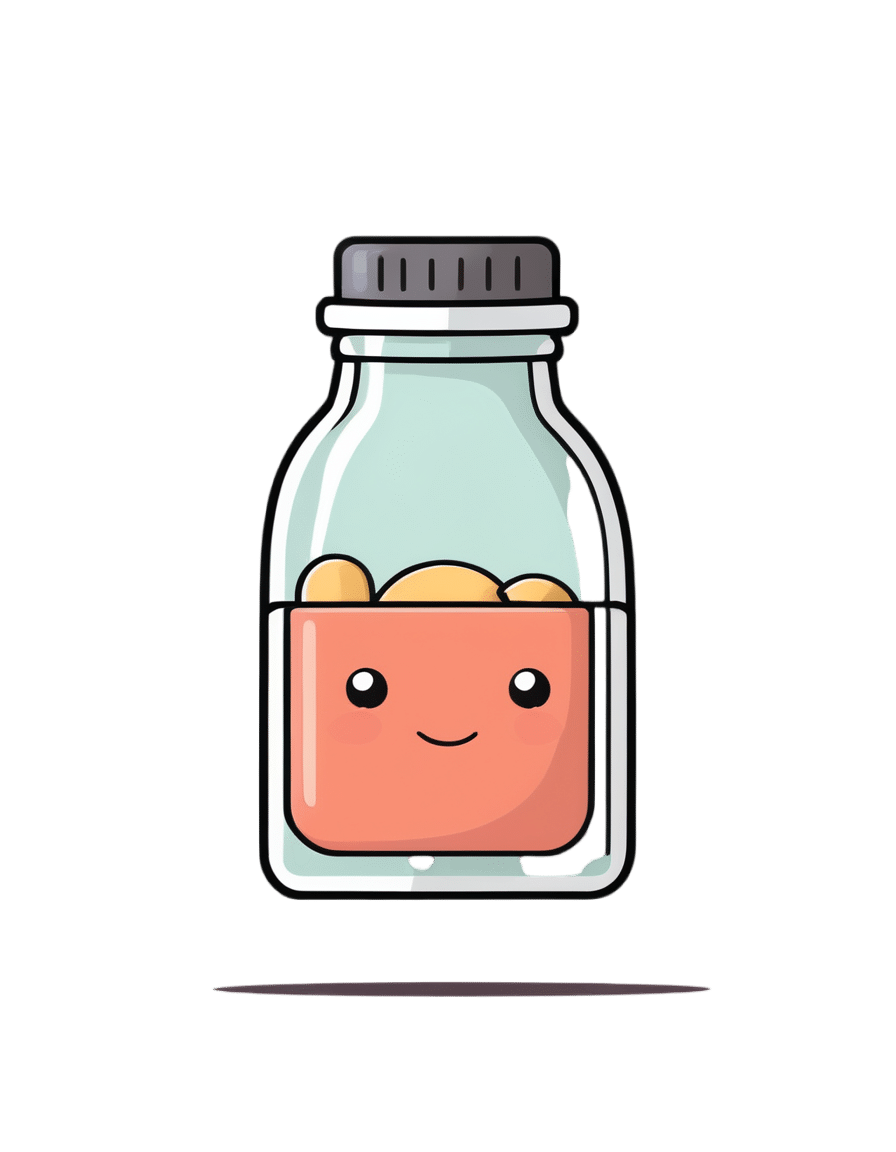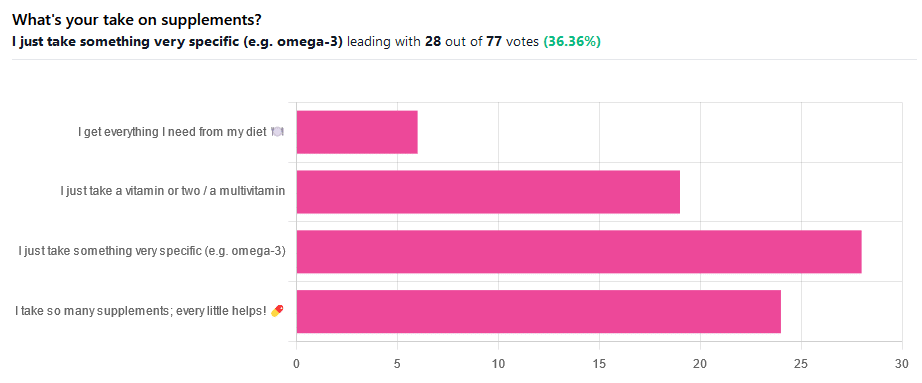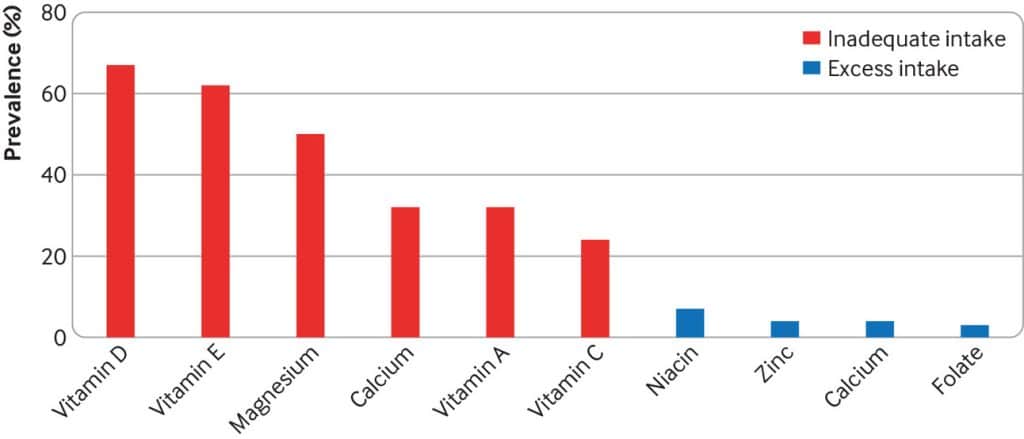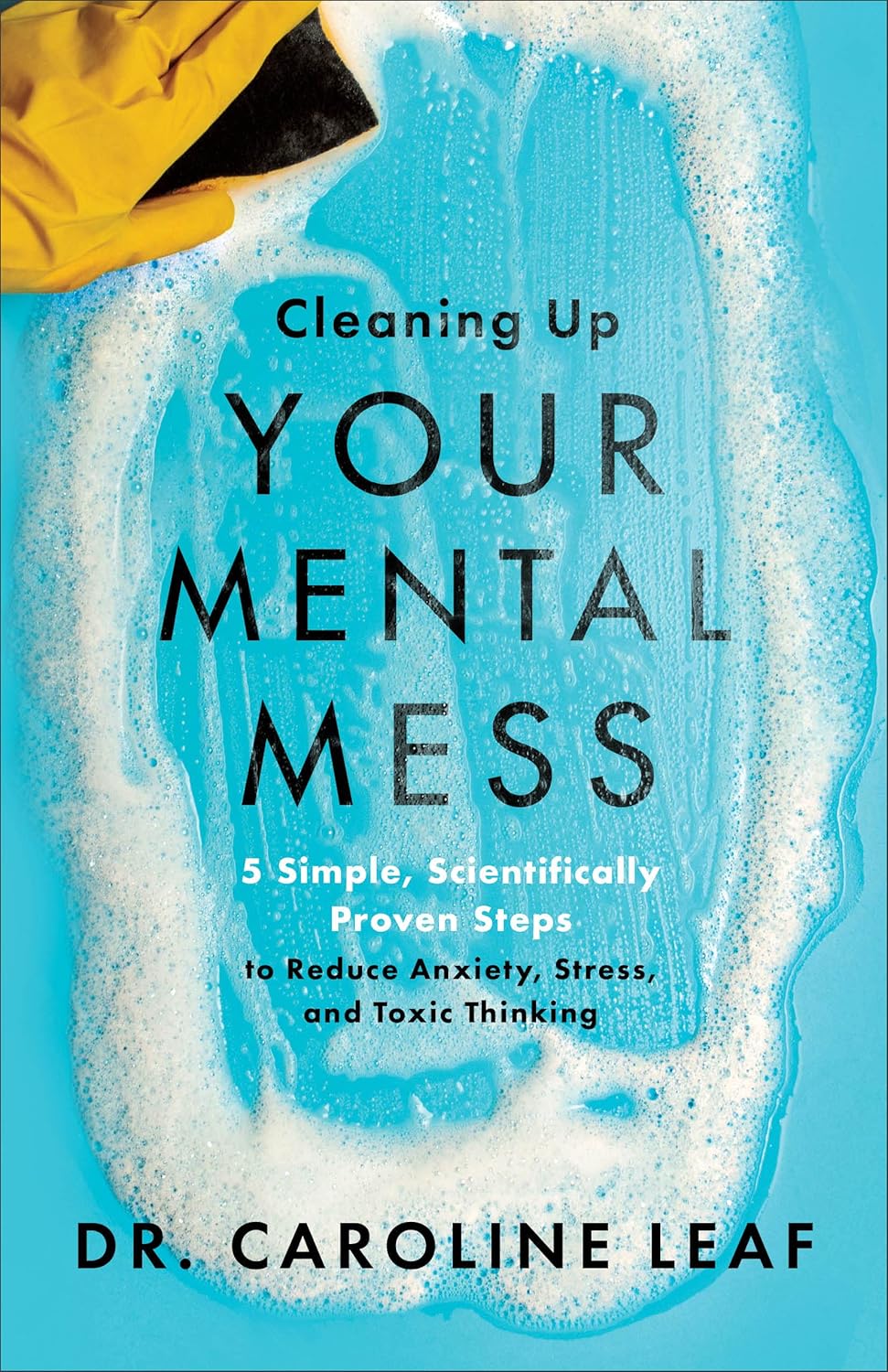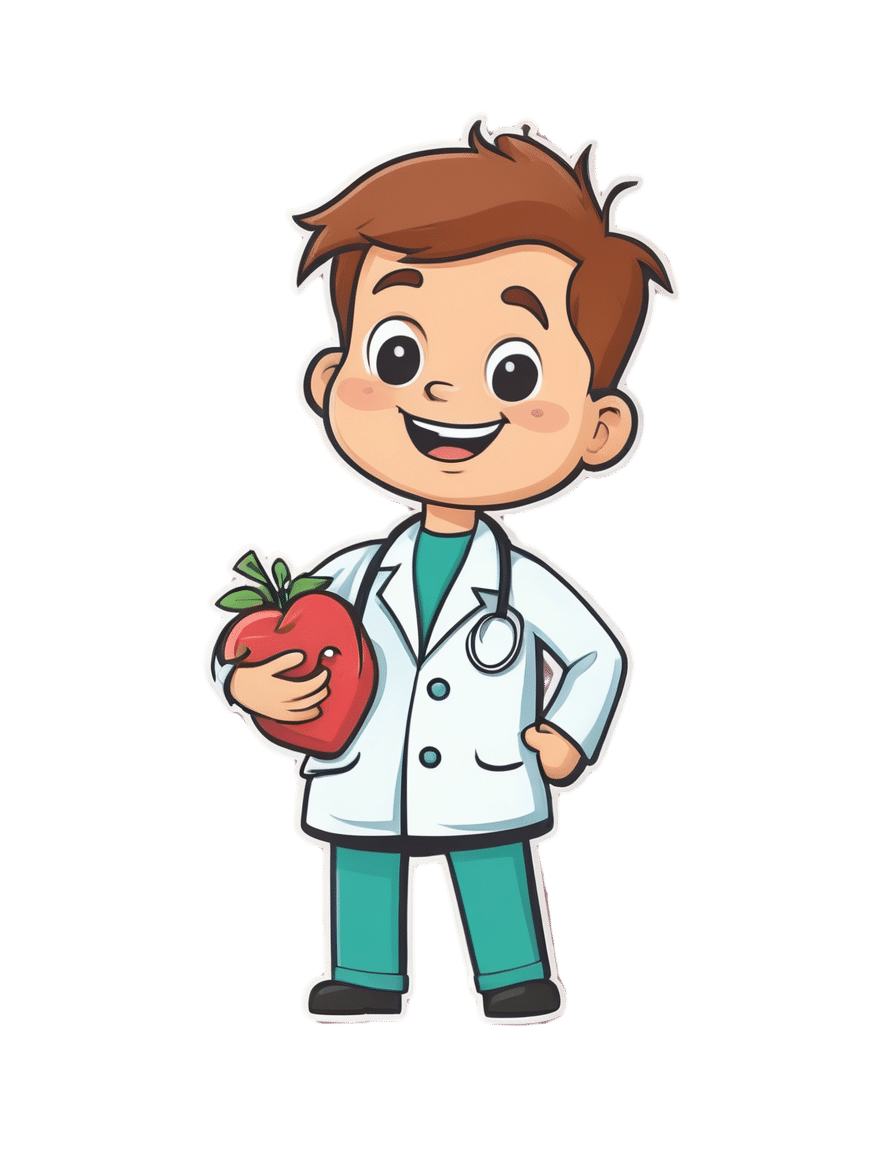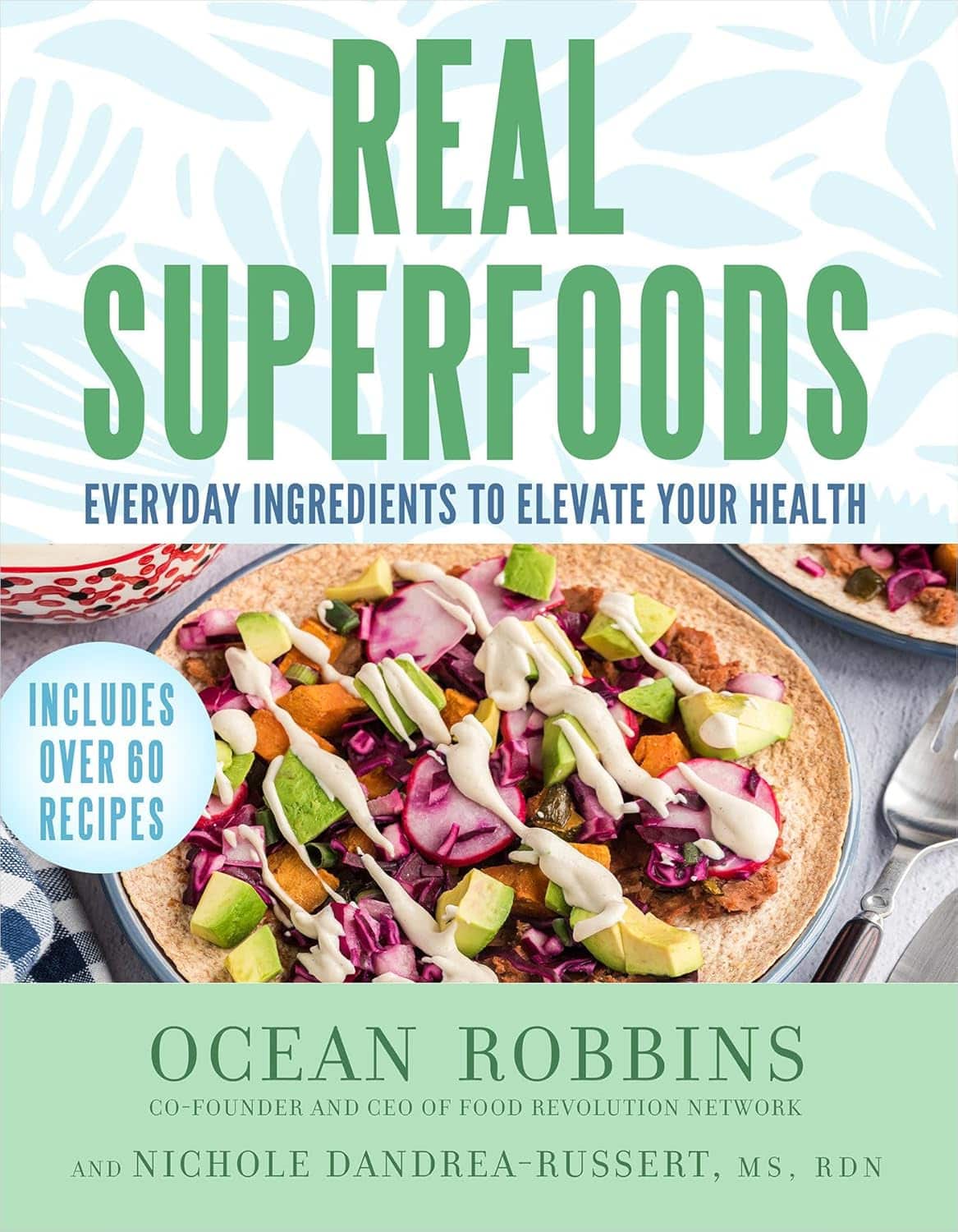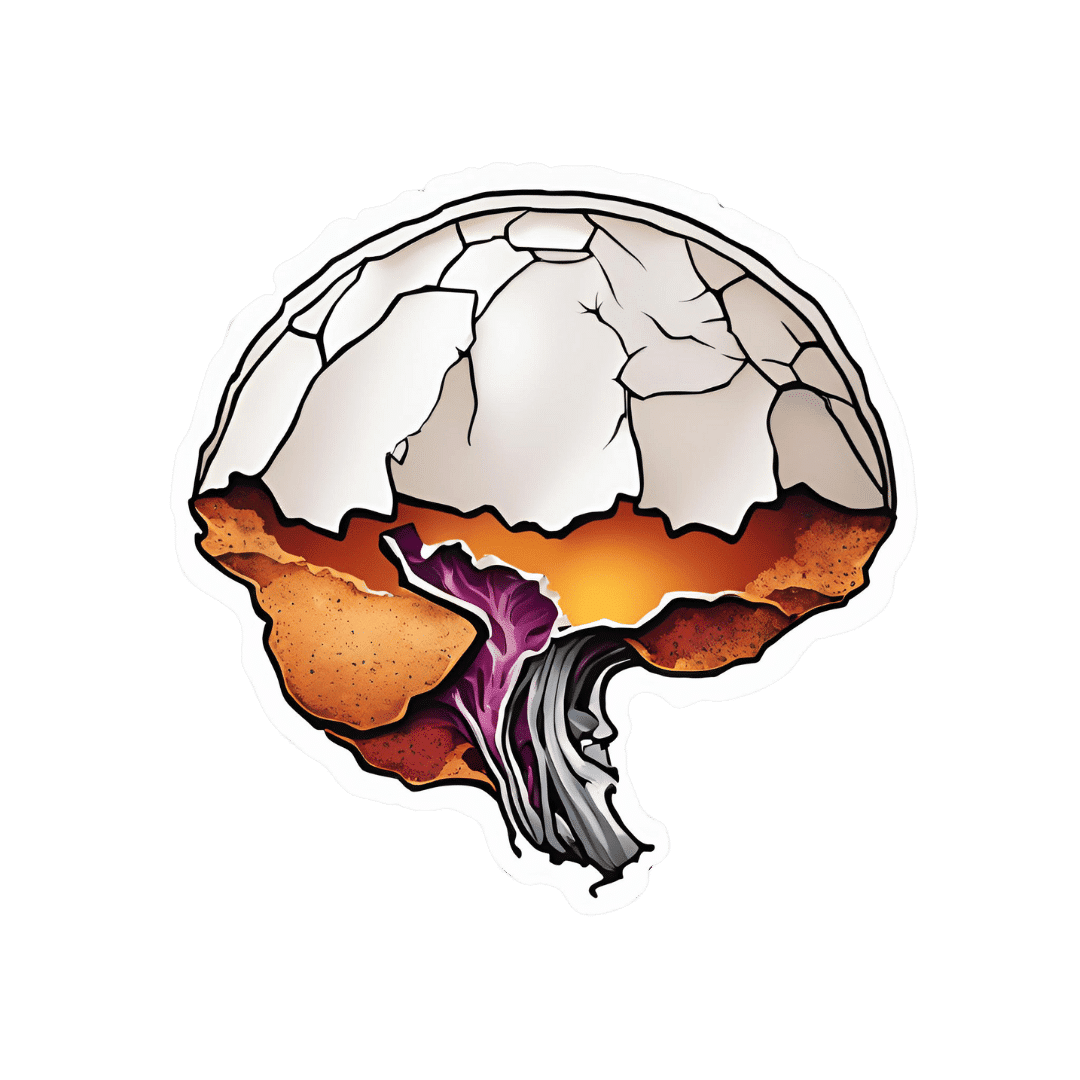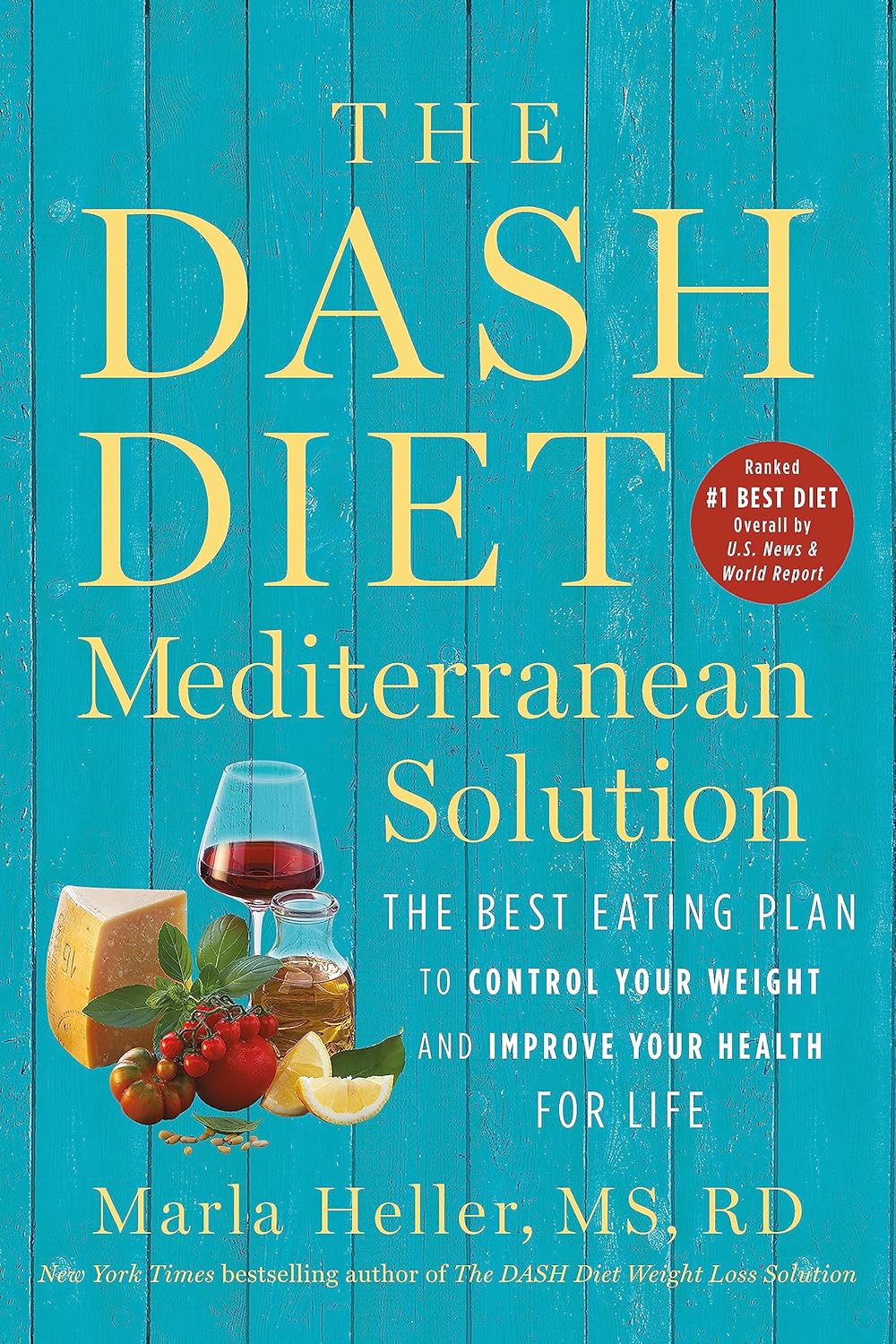
The DASH Diet Mediterranean Solution – by Dr. Marla Heller
10almonds is reader-supported. We may, at no cost to you, receive a portion of sales if you purchase a product through a link in this article.
Sometimes, an author releases a series of books that could have just been one book, with various padding and rehashes. In some cases, naming no names Dr. Mark Hyman, it means we have to carefully pick out the honestly very good and highly recommendable ones from the “you just republished for the extra income, didn’t you?” ones.
In this case, today’s book is part of a series of books with very similar titles, and this one seems the most useful as a standalone book
The Mediterranean Diet is still the scientific world’s current “gold standard” in terms of most evidence-based diet for general health, and as we’ve written about, it can be tweaked to focus on being best for [your particular concern here]. In this case, it’s the DASH variant of the Mediterranean Diet, considered best for heart health specifically.
The style is repetitive, and possibly indicative of the author getting into a habit of having to pad books. Nevertheless, saying things too often is better than forgetting to say them, so hey. On which note, it is more of an educational book than a cookbook—it does have recipes, but not many.
Bottom line: if you’d like an introduction to the DASH variant of the Mediterranean Diet, this book will get you well-acquainted.
Click here to check out The DASH Diet Mediterranean Solution, and learn all about it!
Don’t Forget…
Did you arrive here from our newsletter? Don’t forget to return to the email to continue learning!
Recommended
Learn to Age Gracefully
Join the 98k+ American women taking control of their health & aging with our 100% free (and fun!) daily emails:
-
Do We Need Supplements, And Do They Work?
10almonds is reader-supported. We may, at no cost to you, receive a portion of sales if you purchase a product through a link in this article.
Does our diet need a little help?
We asked you for your take on supplements, and got the above-illustrated, below-described set of results.
- The largest minority of respondents (a little over a third) voted for “I just take something very specific”
- The next most respondents voted for “I take so many supplements; every little helps!”
- Almost as many voted for “I just take a vitamin or two / a multivitamin”
- Fewest, about 8%, voted for “I get everything I need from my diet”
But what does the science say?
Food is less nutritious now than it used to be: True or False?
True or False depending on how you measure it.
An apple today and an apple from a hundred years ago are likely to contain the same amounts of micronutrients per apple, but a lower percentage of micronutrients per 100g of apple.
The reason for this is that apples (and many other food products; apples are just an arbitrary example) have been selectively bred (and in some cases, modified) for size, and because the soil mineral density has remained the same, the micronutrients per apple have not increased commensurate to the increase in carbohydrate weight and/or water weight. Thus, the resultant percentage will be lower, despite the quantity remaining the same.
We’re going to share some science on this, and/but would like to forewarn readers that the language of this paper is a bit biased, as it looks to “debunk” claims of nutritional values dropping while skimming over “yes, they really have dropped percentage-wise” in favor of “but look, the discrete mass values are still the same, so that’s just a mathematical illusion”.
The reality is, it’s no more a mathematical illusion than is the converse standpoint of saying the nutritional value is the same, despite the per-100g values dropping. After all, sometimes we eat an apple as-is; sometimes we buy a bag of frozen chopped fruit. That 500g bag of chopped fruit is going to contain less copper (for example) than one from decades past.
Here’s the paper, and you’ll see what we mean:
Supplements aren’t absorbed properly and thus are a waste of money: True or False?
True or False depending on the supplement (and your body, and the rest of your diet)
Many people are suffering from dietary deficiencies of vitamins and minerals, that could be easily correctable by supplementation:
However, as this study by Dr. Fang Fang Zhang shows, a lot of vitamin and mineral supplementation does not appear to have much of an effect on actual health outcomes, vis-à-vis specific diseases. She looks at:
- Cardiovascular disease
- Cancer
- Type 2 diabetes
- Osteoporosis
Her key take-aways from this study were:
- Randomised trial evidence does not support use of vitamin, mineral, and fish oil supplements to reduce the risk of non-communicable diseases
- People using supplements tend to be older, female, and have higher education, income, and healthier lifestyles than people who do not use them
- Use of supplements appreciably reduces the prevalence of inadequate intake for most nutrients but also increases the prevalence of excess intake for some nutrients
- Further research is needed to assess the long term effects of supplements on the health of the general population and in individuals with specific nutritional needs, including those from low and middle income countries
Read her damning report: Health effects of vitamin and mineral supplements
On the other hand…
This is almost entirely about blanket vitamin-and-mineral supplementation. With regard to fish oil supplementation, many commercial fish oil supplements break down in the stomach rather than the intestines, and don’t get absorbed well. Additionally, many people take them in forms that aren’t pleasant, and thus result in low adherence (i.e., they nominally take them, but in fact they just sit on the kitchen counter for a year).
One thing we can conclude from this is that it’s good to check the science for any given supplement before taking it, and know what it will and won’t help for. Our “Monday Research Review” editions of 10almonds do this a lot, although we tend to focus on herbal supplements rather than vitamins and minerals.
We can get everything we need from our diet: True or False?
Contingently True (but here be caveats)
In principle, if we eat the recommended guideline amounts of various macro- and micro-nutrients, we will indeed get all that we are generally considered to need. Obviously.
However, this may come with:
- Make sure to get enough protein… Without too much meat, and also without too much carbohydrate, such as from most plant sources of protein
- Make sure to get enough carbohydrates… But only the right kinds, and not too much, nor at the wrong time, and without eating things in the wrong order
- Make sure to get enough healthy fats… Without too much of the unhealthy fats that often exist in the same foods
- Make sure to get the right amount of vitamins and minerals… We hope you have your calculators out to get the delicate balance of calcium, magnesium, potassium, phosphorus, and vitamin D right.
That last one’s a real pain, by the way. Too much or too little of one or another and the whole set start causing problems, and several of them interact with several others, and/or compete for resources, and/or are needed for the others to do their job.
And, that’s hard enough to balance when you’re taking supplements with the mg/µg amount written on them, never mind when you’re juggling cabbages and sardines.
On the topic of those sardines, don’t forget to carefully balance your omega-3, -6, and -9, and even within omega-3, balancing ALA, EPA, and DHA, and we hope you’re juggling those HDL and LDL levels too.
So, when it comes to getting everything we need from our diet, for most of us (who aren’t living in food deserts and/or experiencing food poverty, or having a medical condition that restricts our diet), the biggest task is not “getting enough”, it’s “getting enough of the right things without simultaneously overdoing it on the others”.
With supplements, it’s a lot easier to control what we’re putting in our bodies.
And of course, unless our diet includes things that usually can’t be bought in supermarkets, we’re not going to get the benefits of taking, as a supplement, such things as:
Etc.
So, there definitely are supplements with strong science-backed benefits, that probably can’t be found on your plate!
Share This Post
-
Cleaning Up Your Mental Mess – by Dr. Caroline Leaf
10almonds is reader-supported. We may, at no cost to you, receive a portion of sales if you purchase a product through a link in this article.
First of all, what mental mess is this? Well, that depends on you, but common items include:
- Anxiety
- Depression
- Stress
- Trauma
Dr. Caroline Leaf also includes the more nebulous item “toxic thoughts”, but this is mostly a catch-all term.
Given that it says “5 simple scientifically proven steps”, it would be fair if you are wondering:
“Is this going to be just basic CBT stuff?”
And… First, let’s not knock basic CBT stuff. It’s not a panacea, but it’s a great tool for a lot of things. However… Also, no, this book is not about just basic CBT stuff.
In fact, this book’s methods are presented in such a novel way that this reviewer was taken aback by how unlike it was to anything she’d read before.
And, it’s not that the components themselves are new—it’s just that they’re put together differently, in a much more organized comprehensive and systematic way, so that a lot less stuff falls through the cracks (a common problem with standalone psychological tools and techniques).
Bottom line: if you buy one mental health self-help book this year, we recommend that it be this one
Click here to check out Cleaning Up Your Mental Mess, and take a load off your mind!
Share This Post
-
Monosodium Glutamate: Sinless Flavor-Enhancer Or Terrible Health Risk?
10almonds is reader-supported. We may, at no cost to you, receive a portion of sales if you purchase a product through a link in this article.
What’s The Deal With MSG?
There are a lot of popular beliefs about MSG. Is there a grain of truth, or should we take them with a grain of salt? We’ll leap straight into myth-busting:
MSG is high in salt
True (technically) False (practically)
- MSG is a salt (a monosodium salt of L-glutamic acid), but to call it “full of salt” in practical terms is like calling coffee “full of fruit”. (Coffee beans are botanically fruit)
- It does contain sodium, though which is what the S stands for!
- We talked previously about how MSG’s sodium content is much lower than that of (table) salt. Specifically, it’s about one third of that of sodium chloride (e.g. table salt).
MSG triggers gluten sensitivity
False!
Or at least, because this kind of absolute negative is hard to prove in science, what we can say categorically is: it does not contain gluten. We understand that the similar name can cause that confusion. However:
- Gluten is a protein, found in wheat (and thus wheat-based foods).
- Glutamate is an amino acid, found in protein-rich foods.
- If you’re thinking “but proteins are made from amino acids”, yes, they are, but the foundational amino acid of gluten is glutamine, not glutamate. Different bricks → different house!
The body can’t process MSG correctly
False!
The body has glutamate receptors throughout the gut and nervous system.
The body metabolizes glutamate from MSG just the same as from any other food that contains it naturally.
Read: Update on food safety of monosodium l-glutamate (MSG) ← evidence-based safety review
MSG causes “Chinese Restaurant Syndrome”
False!
Racism causes that. It finds its origins in what was originally intended as a satirical joke, that the papers picked up and ran with, giving it that name in the 1960s. As to why it grew and persisted, that has more to do with US politics (the US has been often at odds with China for a long time) and xenophobia (people distrust immigrants, such as those who opened restaurants), including nationalistic rhetoric associating immigrants with diseases.
Read: Xenophobia in America in the Age of Coronavirus and Beyond ← academic paper that gives quite a compact yet comprehensive overview
Research science, meanwhile, has not found any such correlation, in more than 40 years of looking.
PS: we realize this item in the list is very US-centric. Apologies to our non-US subscribers. We know that this belief isn’t so much of a thing outside the US—though it certainly can crop up elsewhere sometimes, too.
Are there any health risks associated with MSG, then?
Well, as noted, it does contain sodium, albeit much less than table salt. So… do go easy on it, all the same.
Aside from that, the LD50 (a way of measuring toxicity) of MSG is 15.8g/kg, so if for example you weigh 150lb (68 kg), don’t eat 2.2lb (a kilogram) of MSG.
There have been some studies on rats (or in one case, fruit flies) that found high doses of MSG could cause heart problems and/or promote obesity. However:
- this has not been observed to be the case in humans
- those doses were really high, ranging from 1g/kg to 8g/kg. So that’d be the equivalent of our 150lb person eating it by the cupful
- it was injected (as a solution) into the rats, not ingested by them
- so don’t let someone inject you with a cup of MSG!
Read: A review of the alleged health hazards of monosodium glutamate
Bottom line on MSG and health:
Enjoy in moderation, but enjoy if you wish! MSG is just the salt form of the amino acid glutamate, which is found naturally in many foods, including shrimp, seaweed, and tomatoes.
Scientists have spent more than 40 years trying to find health risks for MSG, and will probably keep trying (which is as science should be), but for now… Everything has either come up negative, or has been the result of injecting laboratory animals with megadoses.
If you’d like to try it in your cooking as a low-sodium way to bring out the flavor of your dishes, you can order it online. Cheapest in bulk, but try it and see if you like it first!
(I’ll be real with you… I have 5 kg in the pantry myself and use about half a teaspoon a day, cooking for two)
Share This Post
Related Posts
-
Real Superfoods – by Ocean Robbins & Nichole Dandrea-Russert
10almonds is reader-supported. We may, at no cost to you, receive a portion of sales if you purchase a product through a link in this article.
Of the two authors, the former is a professional public speaker, and the latter is a professional dietician. As a result, we get a book that is polished and well-presented, while actually having a core of good solid science (backed up with plenty of references).
The book is divided into two parts; the first part has 9 chapters pertaining to 9 categories of superfood (with more details about top-tier examples of each, within), and the second part has 143 pages of recipes.
And yes, as usual, a couple of the recipes are “granola” and “smoothie”, but when are they not? Most of the recipes are worthwhile, though, with a lot of good dishes that should please most people.
Bottom line: this is half pop-science presentation of superfoods, and half cookbook featuring those ingredients. Definitely a good way to increase your consumption of superfoods, and get the most out of your diet.
Click here to check out Real Superfoods, and power up your health!
Don’t Forget…
Did you arrive here from our newsletter? Don’t forget to return to the email to continue learning!
Learn to Age Gracefully
Join the 98k+ American women taking control of their health & aging with our 100% free (and fun!) daily emails:
-
Eggcellent News Against Dementia?
10almonds is reader-supported. We may, at no cost to you, receive a portion of sales if you purchase a product through a link in this article.
It’s that time of the week again… We hope all our readers have had a great and healthy week! Here are some selections from health news from around the world:
Moderation remains key
Eggs have come under the spotlight for their protective potential against dementia, largely due to their content of omega-3 fatty acids, choline, and other nutrients.
Nevertheless, the study had some limitations (including not measuring the quantity of eggs consumed, just the frequency), and while eating eggs daily showed the lowest rates of dementia, not eating them at all did not significantly alter the risk.
Eating more than 2 eggs per day is still not recommended, however, for reasons of increasing the risk of other health issues, such as heart disease.
Read in full: Could eating eggs prevent dementia?
Related: Eggs: Nutritional Powerhouse or Heart-Health Timebomb?
More than suitable
It’s common for a lot of things to come with the warning “not suitable for those who are pregnant or nursing”, with such frequency that it can be hard to know what one can safely do/take while pregnant or nursing.
In the case of COVID vaccines, though, nearly 90% of babies who had to be hospitalized with COVID-19 had mothers who didn’t get the vaccine while they were pregnant.
And as for how common that is: babies too young to be vaccinated (so, under 6 months) had the highest covid hospitalization rate of any age group except people over 75.
Read in full: Here’s why getting a covid shot during pregnancy is important
Related: The Truth About Vaccines
Positive dieting
Adding things into one’s diet is a lot more fun than taking things out, is generally easier to sustain, and (as a general rule of thumb; there are exceptions of course) give the greatest differences in health outcomes.
This is perhaps most true of beans and pulses, which add many valuable vitamins, minerals, protein, and perhaps most importantly of all (single biggest factor in reducing heart disease risk), fiber.
Read in full: Adding beans and pulses can lead to improved shortfall nutrient intakes and a higher diet quality in American adults
Related: Intuitive Eating Might Not Be What You Think
Clearing out disordered thinking
Hoarding is largely driven by fear of loss, and this radical therapy tackles that at the root, by such means as rehearsing alternative outcomes of discarding through imagery rescripting, and examining the barriers to throwing things away—to break down those barriers one at a time.
Read in full: Hoarding disorder: sensory CBT treatment strategy shows promise
Related: When You Know What You “Should” Do (But Knowing Isn’t The Problem)
Superfluous
Fluoridated water may not be as helpful for the teeth as it used to be prior to about 1975. Not because it became any less effective per se, but because of the modern prevalence of fluoride-containing toothpastes, mouthwashes, etc rendering it redundant in more recent decades.
Read in full: Dental health benefits of fluoride in water may have declined, study finds
Related: Water Fluoridation, Atheroma, & More
Off-label?
With rising costs of living including rising healthcare costs, and increasing barriers to accessing in-person healthcare, it’s little wonder that many are turning to the gray market online to get their medications.
These websites typically use legal loopholes to sell prescription drugs to the public, by employing morally flexible doctors who are content to expediently rubber-stamp prescriptions upon request, on the basis of the patient having filled out a web form and checked boxes for their symptoms (and of course also having waived all rights of complaint or legal recourse).
However, some less scrupulous sorts are exploiting this market, to sell outright fake medications, using a setup that looks like a “legitimate” gray market website. Caveat emptor indeed.
Read in full: CDC warns of fake drug dangers from online pharmacies
Related: Are You Taking PIMs? Getting Off The Overmedication Train
A rising threat
In 2021 (we promise the paper was published only a few days ago!), the leading causes of death were:
- COVID-19
- Heart disease
- Stroke
…which latter represented a rising threat, likely in part due to the increase in the aging population.
Read in full: Stroke remains a leading cause of death globally, with increased risk linked to lifestyle factors
Related: 6 Signs Of Stroke (One Month In Advance)
Take care!
Don’t Forget…
Did you arrive here from our newsletter? Don’t forget to return to the email to continue learning!
Learn to Age Gracefully
Join the 98k+ American women taking control of their health & aging with our 100% free (and fun!) daily emails:
-
Healthy Choco-Banoffee Ice Cream
10almonds is reader-supported. We may, at no cost to you, receive a portion of sales if you purchase a product through a link in this article.
Chocolate, banana, and coffee—quite a threesome, whether for breakfast or dessert, and this is healthy enough for breakfast while being decadent enough for dessert! With no dairy or added sugar, and lots of antioxidants, this is a healthy way to start or end your day.
You will need
- 3 bananas
- 2 tbsp cocoa powder, no additives
- 2 shots espresso, chilled
- 1 tsp vanilla extract
- On standby: milk of your choice—we recommend almond or hazelnut
Method
(we suggest you read everything at least once before doing anything)
1) Peel, slice, and freeze the bananas (let them freeze for at least 2–3 hours)
2) Blend the ingredients, except the milk. Add milk as necessary if the mixture is too thick to blend. Be careful not to add too much at once though, or it will become less of an ice cream and more of a milkshake!
3) Scoop into a sundae glass to serve:
Enjoy!
Want to learn more?
For those interested in some of the science of what we have going on today:
- Which Plant Milk?
- The Bitter Truth About Coffee (or is it?)
- Cacao vs Carob – Which is Healthier?
- Apples vs Bananas – Which is Healthier?
- Which Sugars Are Healthier, And Which Are Just The Same?
- Tasty Polyphenols
Take care!
Don’t Forget…
Did you arrive here from our newsletter? Don’t forget to return to the email to continue learning!
Learn to Age Gracefully
Join the 98k+ American women taking control of their health & aging with our 100% free (and fun!) daily emails:

